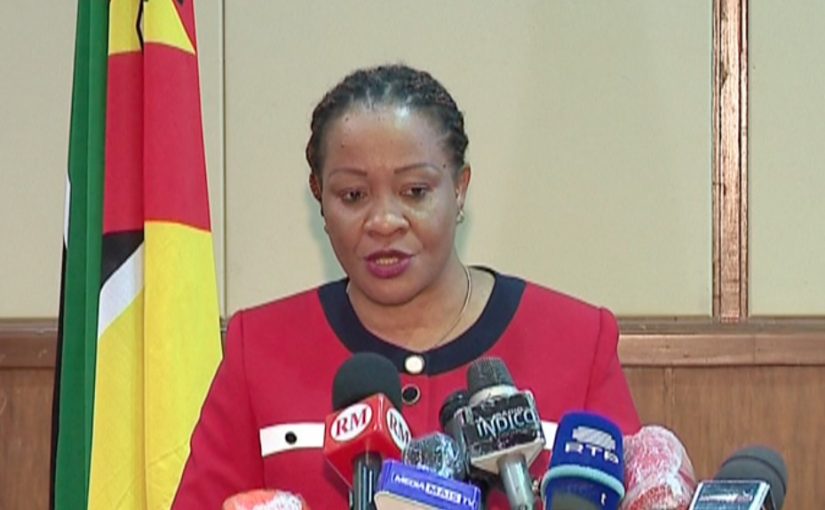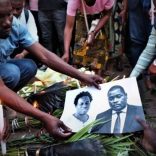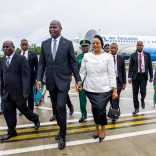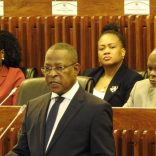Mozambique: Police continue to investigate the murders of Elvino Dias and Paulo Guambe, one year on
Covid-19: More details on the measures to be applied during State of Emergency – Carta

Photo: TVM
It took almost 48 hours after the ratification by the Assembly of the Republic of the Presidential Decree declaring the 30-day State of Emergency in Mozambique for citizens to learn what they should or should not do during this period.
A press conference held after 9:00 p.m. to announce that administrative measures would be announced on the following day, Thursday, and a last minute postponement even then preceded the most anticipated moment of the second day of the State of Emergency.
Minister of Justice, Constitutional and Religious Affairs, Helena Mateus Kida, was given the honour of announcing the long-awaited administrative measures approved at the IV Extraordinary Session of the Council of Ministers on Wednesday, April 1st.
[You may access the full communication of Minister Helena Kida, in Portuguese, HERE]
Document issuance suspended
The decree aims to protect people from the new coronavirus pandemic, safeguard human life and public health and ensure the functioning of services.
It determines the temporary suspension of issuing entry visas and cancellation of visas already issued, as well as of pending visas.
It also suspends the issuance of travel and civil identification documents, marriage certificates, property registration, criminal registration, automobile registration, legal entity registration, driving license, booklet, land title deeds, licenses and Taxpayer´s Single Identification Number (NUITs).
“Official documents valid and effective until June 30, 2020, even if they have expired, are: Identity Card, DIRE (residence permit), entry order for the import of motor vehicles, driving license and passport. Temporary and residence visas for foreign citizens residing in the country are also valid for the same period,” Minister Kida explained.
Kida also said that, during this period, all confirmed cases of Covid-19 and any citizen determined by the competent health authorities would be quarantined.
“The violation of the home quarantine gives rise to its transformation into an institutional quarantine, with the competent authorities being able to invade the offender’s home for collection in the event of resistance,” she said.
The minister added that public and private institutions remain in operation, and should be observing the Covid-19 control and prevention measures, such as the minimum social distance of 1.50 metres, coughing etiquette, frequent washing of the hands, disinfection of the facilities and equipment, the non-sharing of personal utensils, ventilation of the facilities, and reduction of the number of people attending meetings to a maximum of 20.
Labour
The Minister of Justice, Constitutional and Religious Affairs also stated that the actual workforce will be reduced to an amount not exceeding one third, rotating every 15 days.
“It is not to be confused with dismissal from work, and mechanisms must be adopted to ensure the continuation of work at home, subject to conditions. This measure does not cover public officials who occupy positions of direction, leadership and trust, who are to maintain the full exercise of their functions,” explained Kida.
Markets open from 6:00 a.m. to 5:00 p.m.
Markets and formal sales outlets can open from 6:00 a.m. to 5:00 p.m., but could be closed in the face of a high risk of contagion from traders and customers.
“Market management bodies must create the conditions for observing the recommended distance between sellers and between them and buyers and the wearing of masks,” the minister said.
Recreational, sporting, cultural and leisure activities in public spaces are banned.
“Discos, game rooms, bars and stalls, ‘barracas’ selling alcoholic beverages, sports gyms, museums, libraries, theatres, monuments and the like, among others, are closed. Fairs and exhibitions are suspended,” she detailed.
Collective religious services and celebrations are suspended during this period, but the right to freedom of worship individually or at home is not affected.
“Funerals of Covid-19 victims are to be attended by a maximum of 10 people. Regardless of the cause of death, funeral participants are required to wear masks. Cemetery managers must take the necessary measures to comply with the provisions of this article,” she explained.
Hospital visits
The government also decided to reduce visits to hospital patients to a maximum of two people per day for each patient, and to prohibit visits to patients suffering from Covid-19. Visits to penitentiary establishments are also prohibited, but the delivery of meals may continue if containers are disinfected. Medical assistance to detainees who are ill is also guaranteed.
Circulation of txopelas is prohibited
In relation to collective transport of people and goods, the Minister said: “The provision of motorcycle taxi and bicycle taxi services is prohibited. The maximum limit of 1/3 passengers is defined simultaneously in collective transport, public or private, in relation to their capacity. Business and vehicle owners must ensure hygienic and sanitary conditions. Violation of the provisions of this article by private service providers may result in the seizure of the vehicle,” she said.
In this regard, the minister also included the “My Loves” – goods vehicles transporting people and goods to less accessible places – in the list of transport modalities banned during the emergency period, a decision not accepted by society and much less foreseen in the document approved at the Extraordinary Session of the Council of Ministers.
Defence and Security Forces
“The Defence and Security Forces (FDS) can be called on to ensure compliance with the Covid-19 prevention and control measures in the current State of Emergency. A civil requisition of doctors, nurses and other health personnel is determined, outside the National Health System, except for doctors, nurses and other health personnel particularly vulnerable to Covid-19 infection,” the government has determined.
“Public and private media outlets remain operational and must, in the public interest, collaborate with the competent authorities. They should reserve time in their schedules to report on the Covid-19 pandemic under terms to be defined by the Information Office [GABINFO],” the minister said.
“Any media transmitting information that cannot be confirmed by official authorities will have their operating licenses suspended,” the minister said, without explaining her understanding of “information that cannot be confirmed”.
Parole
The Justice minister said that the government intends to parole prisoners who have already served half the sentence, with further details to follow.
Asked about the proposal by the Confederation of Economic Associations of Mozambique (CTA) to suspend the payment of wages and maintain only subsidies, Kida replied that the government wanted all workers to be paid their wages.
Regarding the payment of tuition fees in private schools and universities, the minister revealed that the Ministry of Education and Human Development was tasked with producing a proposal for a decree addressing the situation, for submission to the Council of Ministers.
Anyone not respecting the rules established for the emergency period, Kida said, would be prosecuted for the crime of disobedience.
By Omardine Omar












Leave a Reply
Be the First to Comment!
You must be logged in to post a comment.
You must be logged in to post a comment.